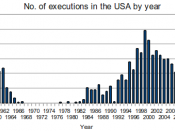Running Head: Capital punishment prevents future murders
Capital punishment prevents future murders
[Writer Name]
[Institute Name]�
Capital punishment prevents future murders
Introduction
Capital punishment is not an act we wish to place on a single soul, but it is the best way to keep the killer out of society and prevent any further murders. Does the death penalty deter crime? There is no concrete evidence of either positive or negative effect. But this does not mean it would not help lower the crime rate. We need to understand that the best way to prevent any possible murders in the future is not let the killer walk free. Death penalty allows us to see the seriousness of a crime and the value of life.
The Capital punishment prevents future murders.
As Stated above, death penalty is generally ordered where the crime is a serious offence such as murder. The courts have generally seen their task of fitting the punishment to the crime perpetrated (Fridell, 2003).
Thus the sentence should adequately reflect the revulsion felt by the victims and citizen. Sentencing should not only be appropriate but should deter the wrong doer from repeating the offence. As a matter of fact it should serve as a deterrence, retribution, rehabilitation, restitution, incapacitation and denunciation.
Society has always used punishment to discourage would be criminals from unlawful action. Since society has the highest interest in preventing murder, it should use the strongest punishment available to deter murder, and that is the capital punishment. If murderers are sentenced to death and executed, potential murderers will think twice before killing for fear of losing their own life (Fridell, 2003).
A study by economist Isaac Ehrlich in 1975 stated that for each person executed, an estimated 7 or 8 other people are saved. According to utilitarianism, this...


